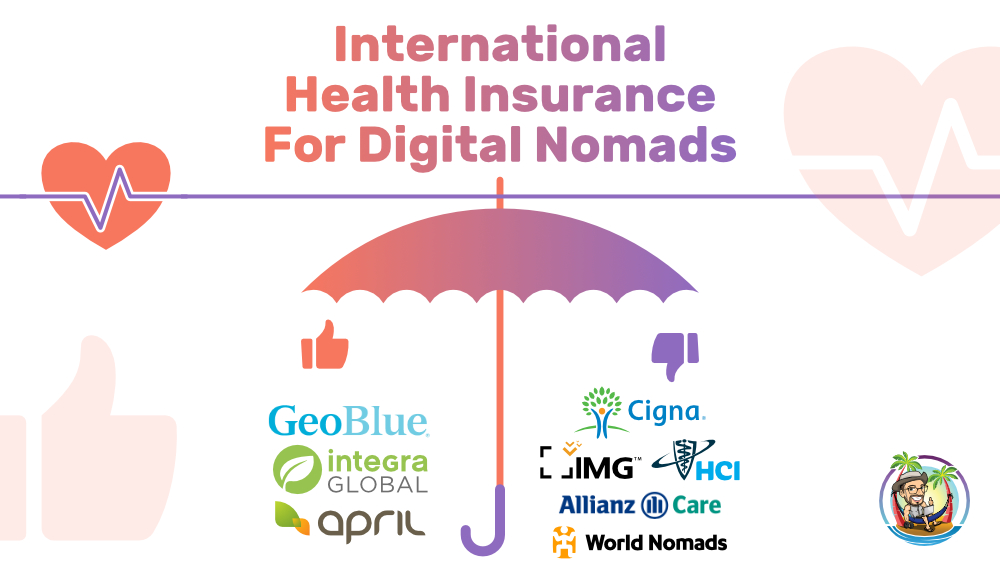Venturing beyond your home country? Whether you’re a seasoned expat or a first-time traveler, securing adequate international health insurance is paramount. It’s not just about peace of mind; it’s about having a safety net in case of unexpected medical emergencies or ongoing healthcare needs. Choosing the right plan, however, can be a complex process with numerous factors to consider.
International health insurance plans offer a range of coverage options, from basic travel insurance to comprehensive plans that cover a wider spectrum of medical expenses. Understanding the different types of plans available, the key features to look for, and the factors influencing cost is essential for making an informed decision that aligns with your individual needs and budget.
International Health Insurance: A Vital Safety Net

International health insurance provides financial protection against unexpected medical expenses incurred while traveling or living abroad. It is crucial for individuals venturing outside their home country, offering peace of mind and financial security in the event of an unforeseen medical emergency.
Benefits of International Health Insurance
International health insurance offers a range of benefits that are particularly valuable for travelers and expats:
- Access to quality healthcare: International health insurance plans often provide access to a network of reputable hospitals and medical professionals worldwide, ensuring access to high-quality medical care when needed.
- Financial protection: International health insurance covers a significant portion of medical expenses, reducing the financial burden of unexpected medical bills. This protection is especially important in countries with high healthcare costs.
- Peace of mind: Knowing that you have insurance coverage can alleviate stress and anxiety associated with potential medical emergencies while traveling or living abroad.
- Medical evacuation: Some plans offer medical evacuation coverage, which can transport you back to your home country for specialized medical care if necessary.
- Repatriation of remains: In the unfortunate event of death, some plans cover the cost of repatriating the deceased’s remains back to their home country.
Factors to Consider When Choosing International Health Insurance
Several key factors should be considered when selecting an international health insurance plan:
- Coverage: Evaluate the plan’s coverage for various medical services, including hospitalization, surgery, emergency medical care, and prescription drugs.
- Geographic coverage: Ensure the plan provides coverage in the countries you plan to visit or reside in.
- Premium: Compare the premiums of different plans and choose one that fits your budget.
- Deductible: Understand the deductible amount, which is the amount you are responsible for paying before the insurance coverage kicks in.
- Exclusions: Be aware of any specific conditions or treatments that are not covered by the plan.
- Claims process: Understand the claims process and how to file a claim in case of a medical emergency.
Types of International Health Insurance
Navigating the world of international health insurance can be daunting, with a variety of plans catering to diverse needs. Understanding the different types available is crucial to finding the best fit for your circumstances. This section will explore the key types of international health insurance, outlining their coverage options and suitability for various individuals and families.
Individual International Health Insurance
Individual international health insurance plans are designed for individuals who are living or traveling abroad for an extended period. They offer comprehensive coverage for medical expenses incurred outside their home country.
- Coverage options: These plans typically cover a wide range of medical expenses, including hospitalization, surgery, doctor visits, and prescription drugs. Some plans may also include coverage for emergency medical evacuation and repatriation, which can be essential for individuals traveling to remote or high-risk areas.
- Pros: Individual plans provide flexibility in terms of coverage options and premiums, allowing individuals to tailor their plan to their specific needs and budget. They are also a good choice for individuals who are traveling independently or working remotely abroad.
- Cons: The premiums for individual plans can be higher than those for family plans, especially for individuals with pre-existing medical conditions. Additionally, some plans may have limitations on coverage for specific medical procedures or treatments.
Family International Health Insurance
Family international health insurance plans are designed to cover multiple family members, providing comprehensive medical coverage for the entire family while they are living or traveling abroad.
- Coverage options: These plans typically offer similar coverage options to individual plans, including medical expenses, emergency medical evacuation, and repatriation. However, they also often include coverage for dependent children and spouses.
- Pros: Family plans are typically more cost-effective than purchasing individual plans for each family member. They also provide peace of mind knowing that the entire family is covered under one plan.
- Cons: Family plans may have higher premiums than individual plans, especially for larger families. Additionally, some plans may have age limits for dependent children or restrictions on coverage for specific medical conditions.
Travel Insurance
Travel insurance is a type of short-term insurance that provides coverage for medical expenses, emergency medical evacuation, and other travel-related risks while traveling abroad.
- Coverage options: Travel insurance plans typically cover medical expenses, emergency medical evacuation, and repatriation. Some plans may also include coverage for lost luggage, travel delays, and cancellation of flights.
- Pros: Travel insurance is a cost-effective way to protect yourself against unexpected medical expenses or travel-related emergencies while traveling abroad. It is also a good option for individuals who are traveling for a short period and do not need comprehensive long-term health insurance.
- Cons: Travel insurance plans typically have limited coverage and may not cover all medical expenses or travel-related risks. Additionally, they may have exclusions for pre-existing medical conditions.
Key Features to Consider

Choosing the right international health insurance plan is crucial, as it provides a financial safety net for unexpected medical expenses while traveling or living abroad. To make an informed decision, you need to carefully evaluate key features that determine the plan’s coverage, cost, and overall value.
Coverage Limits
Coverage limits define the maximum amount the insurance company will pay for specific medical services or conditions. Understanding these limits is essential, as they can impact your out-of-pocket expenses. For example, a plan might have a limit on the number of days covered for hospitalization or the maximum amount payable for a specific medical procedure.
Coverage limits are essential to consider, as they can significantly impact your out-of-pocket expenses.
Deductibles
A deductible is the amount you must pay out-of-pocket before your insurance coverage kicks in. Deductibles can vary significantly between plans, and a higher deductible typically means a lower premium.
For example, a plan with a $1,000 deductible means you would pay the first $1,000 of your medical expenses yourself, and the insurance would cover the remaining costs.
Copayments
Copayments are fixed amounts you pay for specific medical services, such as doctor visits or prescriptions. Copayments are typically a smaller amount than deductibles and are designed to encourage responsible healthcare utilization.
For example, a plan might require a copayment of $20 for each doctor’s visit or $10 for each prescription.
Exclusions
Exclusions are specific medical conditions or services that are not covered by the insurance plan. It’s crucial to understand the exclusions of a plan, as they can leave you financially responsible for unexpected medical expenses.
Common exclusions may include pre-existing conditions, experimental treatments, or cosmetic procedures.
Benefits
International health insurance plans offer various benefits to provide comprehensive coverage. These benefits may include:
- Emergency medical evacuation: This covers the cost of transporting you back to your home country if you experience a medical emergency while traveling abroad.
- Repatriation of remains: This benefit covers the cost of returning your remains to your home country in case of death while abroad.
- Medical expenses: This covers the cost of medical treatment, including hospitalization, surgery, and medication.
- Dental and vision care: Some plans may offer limited coverage for dental and vision care.
Terms and Conditions
It’s essential to thoroughly review the terms and conditions of any international health insurance plan before making a decision. The terms and conditions will Artikel the plan’s coverage, exclusions, and other important details.
For example, you should pay attention to the plan’s geographical coverage, the duration of coverage, and any waiting periods for certain benefits.
Choosing the Right Plan
Selecting the right international health insurance plan is crucial to ensure you have adequate coverage for your needs and budget. This involves careful consideration of your individual circumstances, including your age, health status, travel destinations, and financial capabilities.
Understanding Your Needs
Before diving into plan comparisons, it’s essential to understand your specific health insurance requirements. Consider the following factors:
- Age and Health Status: Younger individuals generally require less extensive coverage than older adults, who may have pre-existing conditions. Individuals with pre-existing conditions should seek plans that offer comprehensive coverage for their specific needs.
- Travel Destinations: Different regions have varying healthcare costs and medical infrastructure. Research the healthcare systems of your intended destinations to determine the level of coverage you need. Some plans may have limitations or exclusions for certain regions.
- Travel Frequency and Duration: Frequent travelers or those planning extended stays abroad may require more comprehensive plans with higher coverage limits. Shorter trips may allow for less extensive coverage options.
- Budget: Determine your budget for health insurance and prioritize features that align with your financial constraints. Compare premiums, deductibles, and co-payments to find a plan that fits your financial situation.
Comparing Plans
Once you understand your needs, you can start comparing different international health insurance plans. Here are some key factors to consider:
- Coverage Limits: Check the maximum amount the plan covers for medical expenses, hospital stays, and other healthcare services. Ensure the limits are sufficient for your needs.
- Exclusions and Limitations: Pay attention to any pre-existing conditions, specific medical procedures, or regions that are excluded from coverage. Understand the plan’s limitations and their impact on your potential healthcare expenses.
- Deductibles and Co-payments: Deductibles are the amounts you pay out-of-pocket before the insurance coverage kicks in. Co-payments are fixed fees you pay for each medical service. Choose plans with deductibles and co-payments that align with your budget.
- Network of Providers: Ensure the plan covers a wide network of hospitals, clinics, and medical professionals in your intended destinations. Check for availability and accessibility of healthcare providers within your chosen regions.
- Claims Process: Understand the process for filing claims, including documentation requirements and processing times. Look for plans with streamlined and efficient claims procedures.
- Customer Service: Research the insurer’s reputation for customer service and responsiveness. Look for plans with 24/7 support and a dedicated international assistance team.
Evaluating Suitability
After comparing different plans, carefully evaluate their suitability for your specific needs. Consider the following:
- Comprehensive Coverage: Choose a plan that offers comprehensive coverage for a wide range of medical expenses, including hospitalization, surgery, emergency medical care, and outpatient services.
- Geographic Coverage: Ensure the plan covers your intended destinations and provides adequate medical assistance worldwide. Some plans may have regional limitations.
- Financial Protection: Select a plan with sufficient coverage limits and affordable deductibles and co-payments to provide adequate financial protection in case of unforeseen medical emergencies.
- Reputation and Reliability: Choose a reputable insurer with a proven track record of providing reliable coverage and excellent customer service. Research the insurer’s financial stability and claims history.
Seeking Expert Advice
If you’re unsure about choosing the right plan, consult with a qualified insurance broker or financial advisor. They can provide personalized recommendations based on your individual needs and help you navigate the complexities of international health insurance.
Factors Affecting Cost
The cost of international health insurance premiums can vary significantly depending on several factors. Understanding these factors can help you make informed decisions when choosing a plan that suits your needs and budget.
Age
Your age is a primary factor influencing premium costs. As you age, your risk of health issues generally increases, leading to higher premiums. Younger individuals typically enjoy lower premiums due to their lower risk profile.
Health History
Your health history plays a crucial role in determining your premium. Individuals with pre-existing medical conditions may face higher premiums, as insurers assess the potential for increased healthcare costs.
Coverage Options
The level of coverage you choose directly impacts the cost of your premiums. Comprehensive plans with extensive benefits, such as global coverage, medical evacuation, and repatriation, generally come with higher premiums compared to basic plans with limited coverage.
Destination
The geographical location where you plan to travel or reside also influences premium costs. Some destinations may have higher healthcare costs or pose greater health risks, leading to higher premiums. For example, premiums for coverage in countries with advanced healthcare systems like the United States or Switzerland tend to be higher than those for coverage in countries with more affordable healthcare systems.
Provider Differences
Different insurance providers may offer varying premiums for similar plans. This variation can be attributed to factors such as their risk assessment methodologies, administrative costs, and profit margins. It’s essential to compare quotes from multiple providers to find the most competitive rates.
Tips for Finding Affordable International Health Insurance
- Consider a higher deductible: Choosing a higher deductible can lower your monthly premiums, as you agree to pay more out-of-pocket for smaller claims. This strategy is suitable for individuals with good health and a lower risk of frequent claims.
- Explore limited coverage options: If your travel plans are short-term or you have a specific medical need, you may consider a limited coverage plan that focuses on your specific requirements. These plans often come with lower premiums.
- Compare quotes from multiple providers: It’s crucial to compare quotes from different insurance providers to find the best value for your needs. Online comparison tools can simplify this process.
- Consider regional coverage: If your travel plans are limited to specific regions, regional coverage options may be more affordable than global plans. However, ensure the coverage aligns with your travel itinerary.
- Look for discounts: Some insurers offer discounts for factors such as group membership, multi-year policies, or healthy lifestyle choices.
Top International Health Insurance Providers
Choosing the right international health insurance provider is crucial for ensuring adequate coverage and peace of mind while traveling or living abroad. Several reputable providers offer a wide range of plans and benefits to meet diverse needs.
Reputable International Health Insurance Providers
Here is a table showcasing some of the leading international health insurance providers, their key features, coverage options, and pricing:
| Provider Name | Coverage Options | Key Features | Pricing |
|---|---|---|---|
| Cigna Global | Individual, family, and group plans; various levels of coverage, including comprehensive, essential, and travel plans. | Global network of medical providers, 24/7 emergency assistance, telemedicine services, and optional benefits like dental and vision coverage. | Prices vary based on age, location, coverage level, and plan features. Contact Cigna Global for a personalized quote. |
| Aetna International | Individual, family, and group plans; different levels of coverage, including comprehensive, essential, and travel plans. | Global network of medical providers, 24/7 emergency assistance, telemedicine services, and optional benefits like dental and vision coverage. | Prices vary based on age, location, coverage level, and plan features. Contact Aetna International for a personalized quote. |
| Bupa Global | Individual, family, and group plans; various levels of coverage, including comprehensive, essential, and travel plans. | Global network of medical providers, 24/7 emergency assistance, telemedicine services, and optional benefits like dental and vision coverage. | Prices vary based on age, location, coverage level, and plan features. Contact Bupa Global for a personalized quote. |
| Allianz Worldwide Partners | Individual, family, and group plans; different levels of coverage, including comprehensive, essential, and travel plans. | Global network of medical providers, 24/7 emergency assistance, telemedicine services, and optional benefits like dental and vision coverage. | Prices vary based on age, location, coverage level, and plan features. Contact Allianz Worldwide Partners for a personalized quote. |
It is important to note that these are just a few examples of reputable international health insurance providers. There are many other options available, and the best provider for you will depend on your individual needs and circumstances.
“When choosing an international health insurance provider, it’s essential to compare different plans, coverage options, and pricing to find the best fit for your specific requirements.”
Claim Process and Procedures

Navigating the claim process is a crucial aspect of international health insurance. Understanding the procedures and requirements involved can ensure a smooth and timely reimbursement experience.
Filing a claim for international health insurance typically involves a series of steps, starting with notifying your insurer about the medical event. This notification should be made within the specified timeframe Artikeld in your policy. You will need to provide details about the incident, including the date, location, and nature of the medical event.
Documentation Required for Claim Submission
To support your claim, you will need to gather the necessary documentation. This documentation serves as evidence of the medical expenses incurred and helps facilitate the claim processing. The specific documents required may vary depending on your insurer and the nature of the claim. However, common documents include:
- Claim form: This form is typically provided by your insurer and should be filled out accurately and completely.
- Medical bills and receipts: These documents should clearly state the medical services received, the dates of service, and the amount charged.
- Medical reports: These reports from your healthcare providers should detail your diagnosis, treatment plan, and the reason for the medical expenses.
- Proof of identity: This may include your passport, driver’s license, or other government-issued identification.
- Policy documents: Your insurance policy and any relevant endorsements or riders.
Claim Processing and Payment
Once you have submitted your claim with all the required documentation, the insurer will review the claim and process it according to their internal procedures. The claim processing timeframe can vary depending on the insurer and the complexity of the claim. However, most insurers aim to process claims within a reasonable timeframe, typically within a few weeks.
Upon approval of your claim, the insurer will typically reimburse you for the covered expenses. The reimbursement amount may be subject to deductibles, co-pays, and other policy limitations. Payment methods can vary depending on the insurer, but common options include direct deposit, check, or payment to the healthcare provider.
Tips for Staying Healthy Abroad
Traveling to new destinations can be an enriching experience, but it’s crucial to prioritize your health and well-being. Staying healthy while abroad ensures you can fully enjoy your trip and avoid potential complications.
Essential Vaccinations
Before traveling internationally, it’s essential to consult your doctor or a travel clinic to determine the necessary vaccinations for your destination. The World Health Organization (WHO) and the Centers for Disease Control and Prevention (CDC) provide comprehensive travel health advisories and vaccination recommendations.
- Some common vaccinations include those for hepatitis A and B, typhoid fever, yellow fever, rabies, and meningitis.
- Vaccination schedules vary depending on your destination and individual health history, so it’s crucial to seek professional guidance.
- Ensure you receive vaccinations well in advance of your trip, as some require multiple doses and time to become effective.
Travel Health Advisories
Staying informed about travel health advisories is crucial for safeguarding your well-being.
- The WHO and CDC issue regular updates on health risks and travel recommendations for various destinations, including information on outbreaks, disease prevalence, and safety precautions.
- Reviewing these advisories before and during your trip can help you make informed decisions about your itinerary and take necessary precautions.
- Staying informed about local health conditions allows you to take appropriate measures to protect yourself and avoid unnecessary risks.
Preventive Measures
Taking preventive measures is essential for maintaining good health while traveling.
- Practice good hygiene by washing your hands frequently with soap and water, especially before eating and after using the restroom.
- Avoid consuming food from street vendors or unhygienic establishments, and opt for reputable restaurants with proper food handling practices.
- Drink bottled water or beverages from sealed containers to avoid potential contamination.
- Use insect repellent to protect yourself from mosquito bites, which can transmit diseases like malaria, dengue fever, and Zika virus.
- Be cautious about consuming raw or undercooked meat and seafood, as they can harbor bacteria that cause food poisoning.
- Practice safe sex by using condoms to prevent sexually transmitted infections.
Staying Hydrated
Staying hydrated is essential for overall health, especially in hot climates.
- Drink plenty of water throughout the day, even if you don’t feel thirsty.
- Avoid sugary drinks, as they can dehydrate you.
- Carry a reusable water bottle and refill it regularly.
- If you’re traveling to a region with a high altitude, it’s crucial to stay hydrated due to the thinner air.
Eating Healthy Foods
Maintaining a healthy diet is vital for maintaining your energy levels and immune system.
- Eat plenty of fruits, vegetables, and whole grains to provide your body with essential nutrients.
- Choose lean protein sources and limit your intake of processed foods, sugary snacks, and excessive fats.
- Be mindful of food safety and hygiene practices, especially in unfamiliar environments.
Avoiding Risky Activities
While traveling can be an adventure, it’s essential to avoid activities that pose unnecessary risks to your health.
- Avoid swimming in polluted waters or areas with strong currents.
- Be cautious about engaging in extreme sports or activities that require specialized training or equipment.
- Exercise caution when hiking or trekking in remote areas, and inform others about your plans.
- Avoid consuming alcohol or drugs, as they can impair judgment and increase the risk of accidents or injuries.
Additional Considerations
Navigating the intricacies of international healthcare requires more than just selecting the right insurance plan. Understanding the healthcare landscape in your destination country, the potential challenges, and the role of complementary insurance are crucial for a seamless and secure experience.
Understanding the Local Healthcare System
Familiarizing yourself with the healthcare system in your destination country is essential for a smooth and effective experience. This includes understanding the following:
- Healthcare infrastructure: Investigate the availability of hospitals, clinics, and medical professionals in your destination. This includes understanding the quality of care, specialization levels, and language proficiency of healthcare providers.
- Healthcare regulations: Familiarize yourself with local healthcare laws and regulations, such as licensing requirements for medical professionals, procedures for accessing healthcare, and any specific rules for foreigners.
- Healthcare costs: Research the typical costs for medical services in your destination country. This includes understanding the cost of consultations, medications, hospital stays, and potential out-of-pocket expenses.
- Payment methods: Determine the preferred payment methods for healthcare services, such as cash, credit cards, or insurance claims. Understanding local payment practices helps you avoid potential complications or delays.
Travel Insurance as a Complement
While international health insurance provides essential coverage for medical emergencies, travel insurance plays a crucial role in offering additional protection for unforeseen circumstances. This includes:
- Trip cancellation or interruption: Travel insurance can reimburse you for non-refundable travel expenses if you need to cancel or interrupt your trip due to unexpected events such as illness, injury, or family emergencies.
- Lost or stolen luggage: Travel insurance can cover the cost of replacing lost or stolen luggage, including personal belongings, during your trip.
- Emergency medical evacuation: In cases of serious medical emergencies, travel insurance can cover the cost of transporting you back to your home country for medical treatment.
- Personal liability: Travel insurance can provide coverage for legal expenses if you are involved in an accident or incident that causes damage or injury to others.
Potential Challenges and Risks
Navigating international healthcare can present unique challenges and risks. Understanding these potential obstacles helps you prepare and mitigate potential issues:
- Language barriers: Communicating with healthcare providers in a foreign language can be challenging. Consider the availability of interpreters or translation services.
- Cultural differences: Cultural differences in healthcare practices and communication styles can create misunderstandings. Being aware of these differences can help you navigate healthcare interactions effectively.
- Limited access to specialized care: Access to specialized medical care, such as advanced surgeries or treatments, may be limited in certain countries.
- Medical emergencies: Medical emergencies can occur unexpectedly and require immediate attention. Having a plan for dealing with such situations is crucial.
- Insurance claims processing: Submitting and processing insurance claims while traveling can be complex. Familiarize yourself with the claims process and documentation requirements.
Conclusion

Navigating the complexities of international health insurance can seem daunting, but understanding the essentials is crucial for peace of mind while traveling or living abroad. This guide has provided a comprehensive overview of key considerations, from choosing the right plan to understanding claim procedures and maximizing your health abroad.
Key Takeaways
- International health insurance acts as a vital safety net, offering financial protection against unexpected medical expenses in foreign countries.
- Types of international health insurance vary widely, catering to different needs and budgets, ranging from short-term travel insurance to comprehensive expatriate plans.
- When choosing a plan, factors such as coverage limits, pre-existing conditions, geographical coverage, and emergency medical evacuation are paramount.
- Understanding the claim process and procedures is essential to ensure smooth reimbursement and avoid unnecessary complications.
- Staying proactive about your health, including preventive measures and regular checkups, can significantly reduce the risk of unexpected medical expenses.
- Consulting with a qualified insurance broker or advisor can provide personalized guidance and help you select the most suitable plan for your specific circumstances.
Ending Remarks

Navigating the world of international health insurance can feel daunting, but with careful planning and research, you can find a plan that provides the necessary protection for your travels or expat life. Remember to compare different providers, carefully evaluate coverage options, and seek professional advice if needed. By taking these steps, you can ensure that you’re adequately covered for any health-related challenges that may arise while abroad.

